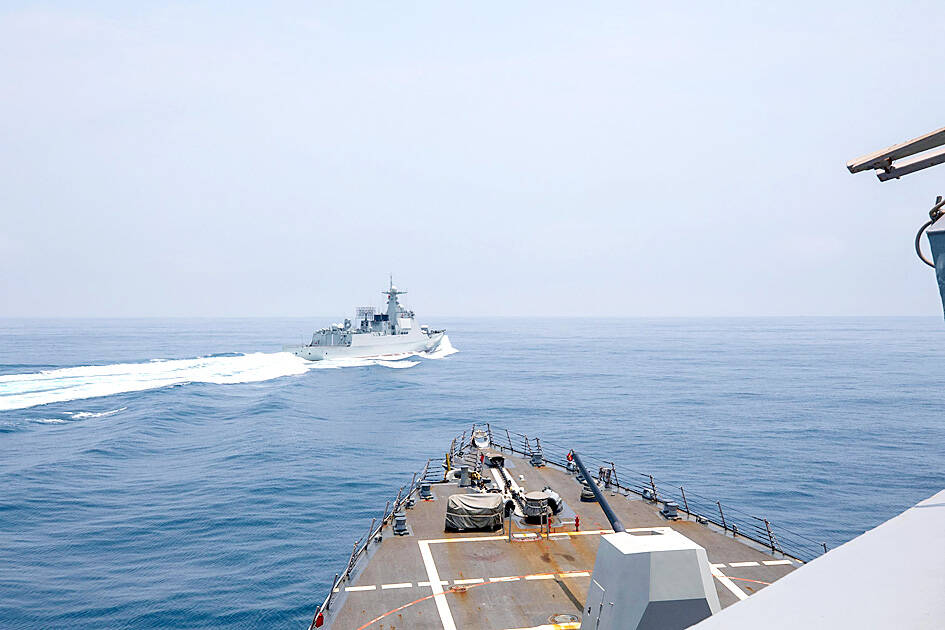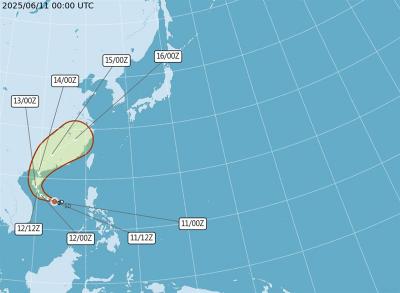A Taiwanese defense expert said he believes the best approach to counter China’s “gray zone” warfare tactics is for the US to ditch its long-held policy of “strategic ambiguity” in favor of “strategic clarity.”
In an article published online on Wednesday, Huang Chung-ting (黃宗鼎), an associate research fellow at the government-funded Institute for National Defense and Security Research, said that Washington has publicly blamed Beijing for two dangerous encounters between the two countries’ militaries over the past few weeks.
One was an incident between the US Navy and a Chinese warship in the Taiwan Strait last week. A video clip released on Sunday by the US appears to show a Chinese vessel crossing in front of a US destroyer, forcing it to slow down to avoid a collision.

Photo: Reuters / US Navy / Mass Communication Specialist 1st Class Andre Richard
Another incident at the end of last month involved a Chinese jet which the US accused of carrying out an “unnecessarily aggressive” maneuver near a US military plane in international airspace over the South China Sea.
Calling the two incidents “unacceptable,” US National Security Council spokesman John Kirby on Monday said that such “unsafe and unprofessional intercepts” could lead to “misunderstandings” and “miscalculations.”
In response, Chinese Ministry of Foreign Affairs spokesman Wang Wenbin (汪文斌) said that “the measures taken by the Chinese military are completely reasonable, legitimate, and professional and safe,” and accused the US of being the aggressor.
Huang said the two Sino-US skirmishes took place near Taiwan’s southeast air defense identification zone and in the Taiwan Strait, seriously jeopardizing Taiwan’s national security and US freedom of navigation.
Such incidents, together with a recent clash in the disputed South China Sea in which Manila accused Beijing of shining a “military grade” laser light at a Philippine coast guard boat, are part of Beijing’s “gray zone” warfare tactics deployed to test US responses to such aggressive behavior, Huang said.
Washington and Manila have a long-standing US-Philippines Mutual Defense Treaty, which dictates that both nations would support each other if either were to be attacked by a third party, Huang said.
However, the treaty does not give a clear definition of what constitutes an attack or whether shining a laser at the Philippine vessel is regarded as a form of attack, he said.
The lack of a clear definition of attack in the mutual defense treaty is one example of US adoption of “strategic ambiguity” to avoid angering China, he said.
To counter China’s “gray zone” warfare, Huang said the US should ditch such ambiguity and make clear what kind of military response it would take should China continue to use similar tactics against the US and other countries.
“Gray zone” tactics are generally defined as coercive actions that do not meet the threshold of conventional warfare.

A magnitude 6.4 earthquake struck off the coast of Hualien County in eastern Taiwan at 7pm yesterday, the Central Weather Administration (CWA) said. The epicenter of the temblor was at sea, about 69.9km south of Hualien County Hall, at a depth of 30.9km, it said. There were no immediate reports of damage resulting from the quake. The earthquake’s intensity, which gauges the actual effect of a temblor, was highest in Taitung County’s Changbin Township (長濱), where it measured 5 on Taiwan’s seven-tier intensity scale. The quake also measured an intensity of 4 in Hualien, Nantou, Chiayi, Yunlin, Changhua and Miaoli counties, as well as

Taiwan is to have nine extended holidays next year, led by a nine-day Lunar New Year break, the Cabinet announced yesterday. The nine-day Lunar New Year holiday next year matches the length of this year’s holiday, which featured six extended holidays. The increase in extended holidays is due to the Act on the Implementation of Commemorative and Festival Holidays (紀念日及節日實施條例), which was passed early last month with support from the opposition Chinese Nationalist Party (KMT) and Taiwan People’s Party. Under the new act, the day before Lunar New Year’s Eve is also a national holiday, and Labor Day would no longer be limited

The first tropical storm of the year in the western North Pacific, Wutip (蝴蝶), has formed over the South China Sea and is expected to move toward Hainan Island off southern China, the Central Weather Administration (CWA) said today. The agency said a tropical depression over waters near the Paracel and Zhongsha islands strengthened into a tropical storm this morning. The storm had maximum sustained winds near its center of 64.8kph, with peak gusts reaching 90kph, it said. Winds at Beaufort scale level 7 — ranging from 50kph to 61.5kph — extended up to 80km from the center, it added. Forecaster Kuan Hsin-ping

COMMITMENTS: The company had a relatively low renewable ratio at 56 percent and did not have any goal to achieve 100 percent renewable energy, the report said Pegatron Corp ranked the lowest among five major final assembly suppliers in progressing toward Apple Inc’s commitment to be 100 percent carbon neutral by 2030, a Greenpeace East Asia report said yesterday. While Apple has set the goal of using 100 percent renewable energy across its entire business, supply chain and product lifecycle by 2030, carbon emissions from electronics manufacturing are rising globally due to increased energy consumption, it said. Given that carbon emissions from its supply chain accounted for more than half of its total emissions last year, Greenpeace East Asia evaluated the green transition performance of Apple’s five largest final